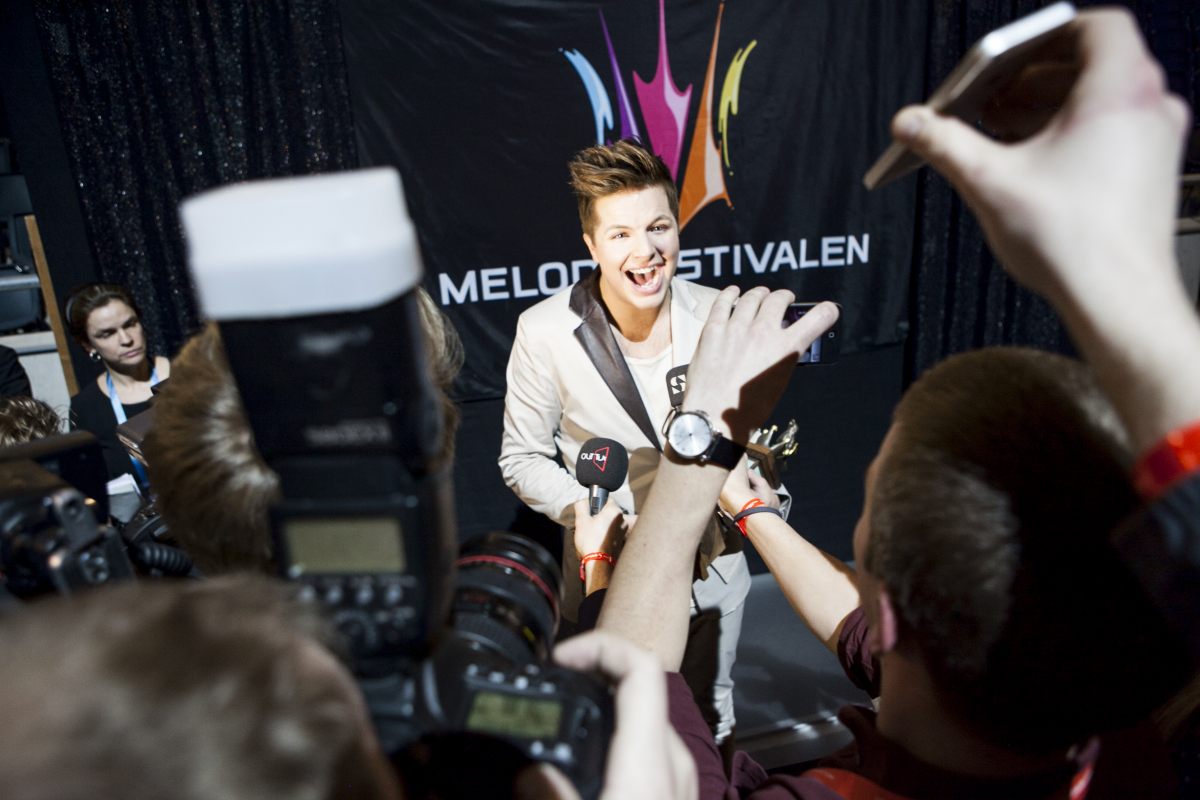It was three weeks ago that Robin Stjernberg was sentenced to the Death Row of Melodifestivalen, Andra Chansen, where songs are given a second chance just to meet an eventual defeat at the end – or so we thought. Now, Robin Stjernberg has proved the bookies wrong and became the first Andra Chansen winner to win Melodifestivalen.
Bookies are still scratching their heads from having hypes-to-flops, Amanda Fondell and Janet Leon, as their favorites to win to predicting a YOHIO-Ralf Gyllenhammar race. This year was not a year for betting. With the bookies wrong and unprecedented history occurring, how did Robin Stjernberg’s “You” win?
 First, never count out the International Jury normally filled with music industry professionals – the only exception is Cyprus, which gave Sean Banan 12 points. Nonetheless, the results strongly communicated to Supervisor Christer Björkman that average singers with great songs do not simply cut it. Ulrik Munther croaked all his big notes on a great song with superior production. YOHIO was terribly off-key and sounded like a mash-up of viral goat-screaming-like-human videos. Everyone else was overshadowed by the strength and finesse of Robin’s voice. It seems like the International Jury wanted a good singer. As a result, Robin was awarded 91 points by the Jury, and runner-up YOHIO received a depressing 30 points. By then, we all knew that it was game over for YOHIO.
First, never count out the International Jury normally filled with music industry professionals – the only exception is Cyprus, which gave Sean Banan 12 points. Nonetheless, the results strongly communicated to Supervisor Christer Björkman that average singers with great songs do not simply cut it. Ulrik Munther croaked all his big notes on a great song with superior production. YOHIO was terribly off-key and sounded like a mash-up of viral goat-screaming-like-human videos. Everyone else was overshadowed by the strength and finesse of Robin’s voice. It seems like the International Jury wanted a good singer. As a result, Robin was awarded 91 points by the Jury, and runner-up YOHIO received a depressing 30 points. By then, we all knew that it was game over for YOHIO.
Why? A 61 point deficit is tough to overcome. If you are a Melodifestivalen “historian” as I shamelessly think of myself at times, 61 points when converted to percentage of the vote is 12.8% – meaning the only way YOHIO could have won is by getting 12.8% more than Robin. That is nearly improbable when you consider Loreen beat Danny by 10% last year and Nanne Grönvall beat Martin Stenmarck by 11% in 2005. At the end, YOHIO received 22% of the vote, and Robin received 16% of the vote – only a 6% difference. The numbers were never in YOHIO’s favor after the Jury vote.
 Second, the Andra Chansen winners tend to get a bounce in public support. It happened to Caroline af Ugglas in 2009 and Thortsen Flinck & Revolutionsorkestern in 2012. It was much more evident this year. Robin and Anton Ewald’s “Begging” came 2nd and 3rd in public voting respectively. What was different for this year? The bar was absurdly set low with the dissatisfaction of current finalists pre-Andra Chansen. While the hype around YOHIO was greatly exaggerated, he was still popular. But, the hype of other front-runners like Ralf and Ulrik have rapidly disappeared after their heats.
Second, the Andra Chansen winners tend to get a bounce in public support. It happened to Caroline af Ugglas in 2009 and Thortsen Flinck & Revolutionsorkestern in 2012. It was much more evident this year. Robin and Anton Ewald’s “Begging” came 2nd and 3rd in public voting respectively. What was different for this year? The bar was absurdly set low with the dissatisfaction of current finalists pre-Andra Chansen. While the hype around YOHIO was greatly exaggerated, he was still popular. But, the hype of other front-runners like Ralf and Ulrik have rapidly disappeared after their heats.
Third, a semifinal is not representative of a final. The demographics change, and the watching audience changes. “You,” a mid-tempo ballad with pronounced percussion, was the “safest” and “easiest-hearing” song for the entire Swedish population – old, young, and middle-aged. Melodifestivalen may be invaded by a ubiquitous harem of annoying teenage girls, but other demographics still proved that they are important to woo over.
Looking forward at Malmö – this may be a blessing in disguise. While other countries send their Loreen-wannabes (just wait for the interpretative dancing choreography for Casada’s Glorious performance), Sweden is staying ahead of the game with someone different with a different type of song that is palatable to a general population. I expect this will do very well.
Best of luck to Robin in Malmö!











A very well written analysis of the results! I wholeheartedly agree with you and I hope that Sweden gets a good result in May because Robin definitely deserves it. I hope that they refine and perfect the performance aspect and maybe consider having him wear something a little bit more masculine but otherwise we don’t have to worry about his live vocals because they were superb.
Love the song so much!
I hope Sweden wins again.
100 points from Serbia